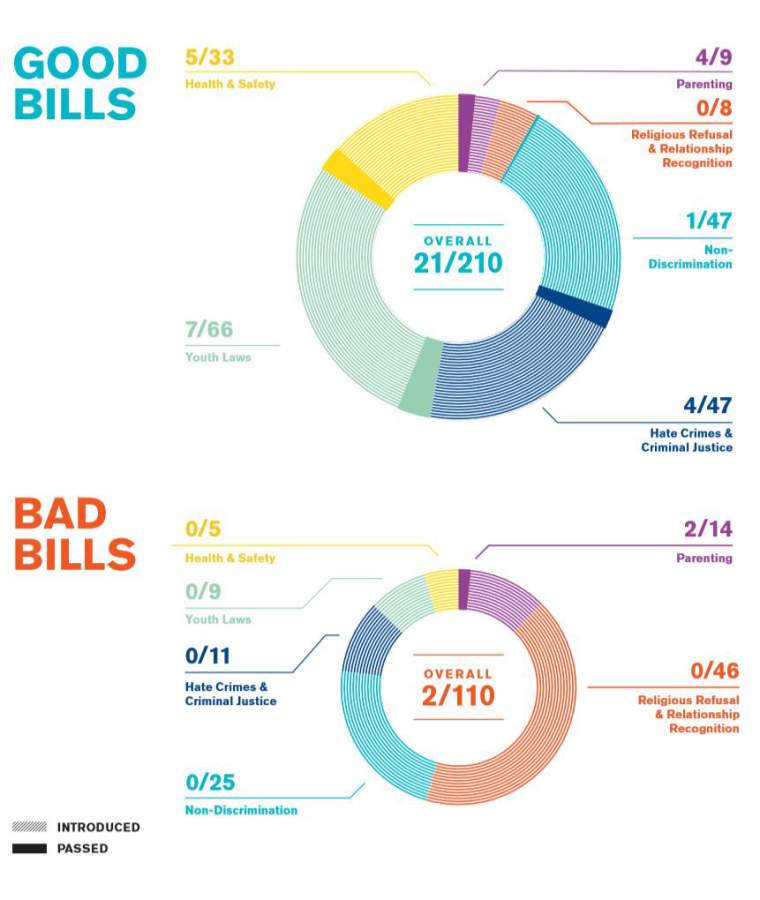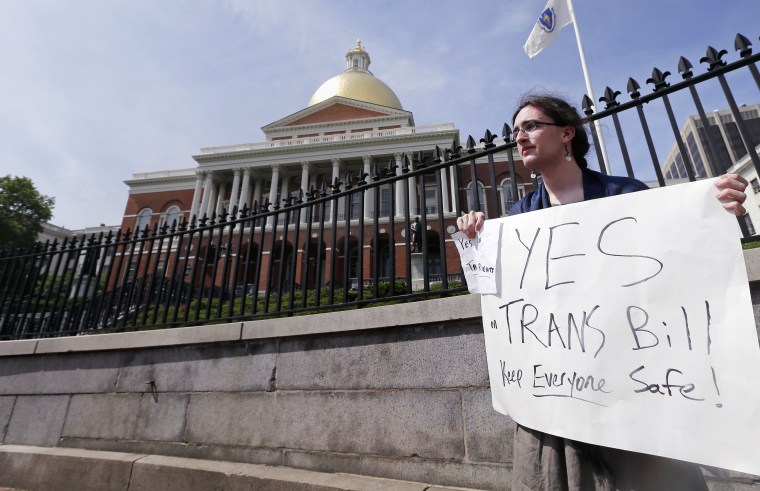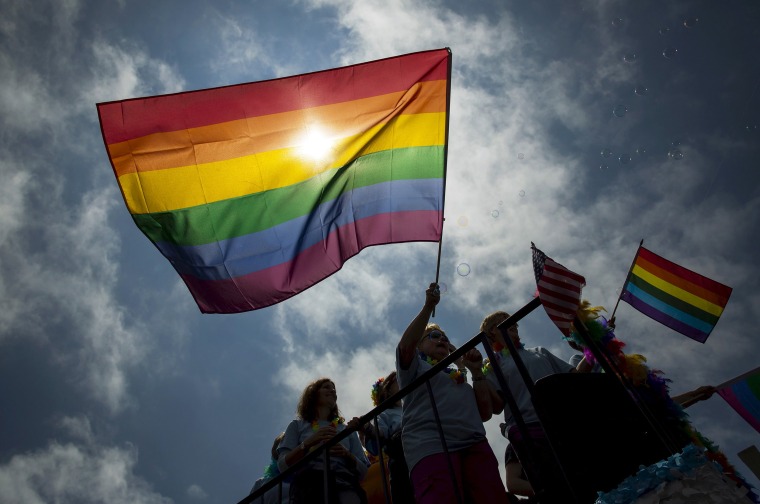State bills advancing LGBTQ rights outpaced those seeking to thwart them in 2018, according to a new report from the Human Rights Campaign, a national LGBTQ advocacy group.
Last year, 21 of the 201 pro-LGBTQ bills introduced in state legislatures became law, while just two of the 110 anti-LGBTQ bills did, according to HRC’s recently released 2018 State Equality Index. Advocates of LGBTQ rights fared much better last year when compared to the year prior: In 2017, 129 anti-LGBTQ bills were introduced and 12 were passed.
“The last several years, we have been facing an onslaught of anti-LGBTQ legislation in the states,” Cathryn Oakley, the report’s co-author and HRC’s state legislative director, told NBC News, adding that 2018’s tally represented a “huge change” from previous years.

In addition to keeping a tally of LGBTQ-related state bills, HRC’s State Equality Index also assigns each state an LGBTQ-equality grade.
“We had a record number of states who scored in our top category,” Oakley said. Seventeen states and the District of Columbia received the highest designation: Working Toward Innovative Equality. On the other end of the spectrum, 28 states received the lowest designation: High Priority to Achieve Basic Equality.
The rankings were based on an analysis of existing LGBTQ-related legislation in each state.
“The strength of the state-based LGBTQ movement is critical to elevate our representation, visibility and equality across the country,” according to Rebecca Isaacs, executive director of Equality Federation Institute, an LGBTQ advocacy organization that partnered with HRC to produce the report.. “As we look to the next legislative session, the State Equality Index should serve as a recognition of how far we have come and how much we have yet to achieve.”
Pro-LGBTQ Legislation
LGBTQ advocates on the state level made progress along several fronts, but nondiscrimination measures and “gay conversion therapy” bans were among the most prevalent, according to the report.
In New Hampshire, Republican Gov. Chris Sununu signed into law a bill that prohibits discrimination based on gender identity in housing, employment and public accommodations.
Hawaii passed a law banning discrimination on the basis of “sex,” including sexual orientation and gender identity and expression, in any state-funded educational program. Washington state prohibited discrimination against LGBTQ people in insurance plans.

In the first statewide referendum on transgender rights, Massachusetts residents voted overwhelmingly in November to maintain a 2016 law that extended nondiscrimination protections to transgender people, including their use of public bathrooms and locker rooms that align with their gender identity.
Of the 25 states that were considering bans on so-called gay conversion therapy on minors last year, five states — Washington, Maryland, Hawaii, New Hampshire and Delaware — passed the bans into law . With New York’s ban on the practice being signed into law last month, the widely discredited practice is now prohibited in 15 states and the District of Columbia.
Oakley called these bans “a bit of a phenomenon,” and stressed that one third of the bills were signed by Republican governors, speaking to the bipartisan support of these laws. She added people are increasingly coming to understand youth conversion therapy as “child abuse.”
Last year also saw advances in transgender rights beyond nondiscrimination protections. Vermont passed a law requiring single-user bathrooms to be gender neutral. New Jersey dropped its surgical requirement for those wishing to change their gender markers on birth certificates, and, along with Rhode Island, will now require death certificates to reflect a person’s gender identity.
There were also significant laws passed related to criminal justice. In California, Democratic Gov. Jerry Brown signed legislation mandating training on sexual orientation and gender identity for police officers and dispatchers. Rhode Island banned the use of “gay or trans panic” defenses, and Massachusetts prohibited the placement of prisoners in solitary confinement because of their LGBTQ status. Connecticut now mandates that transgender inmates be housed in facilities that correspond to their gender identity and ensures transgender inmates are searched by guards that share their gender identity.
LGBTQ-inclusive parenting laws were also passed in Washington, where lawmakers updated parentage law to clarify the rights of non-biological parents and allow compensated surrogacy . New Jersey legislators also revised surrogacy laws, and in California and Hawaii, lawmakers passed legislation that includes a bill of right for LGBTQ youth.
Anti-LGBTQ Laws
The two anti-LGBTQ bills passed in 2018 — one in Oklahoma and the other in Kansas — both had to do with allowing religiously affiliated foster and adoption agencies the ability to refuse to place children with LGBTQ prospective parents.
And just last month, the Department of Health and Human Services issued a waiver to South Carolina to allow federally funded foster care agencies in the state to continue to receive funding while denying services to same-sex or non-Christian couples.
“The proliferation of these bills in states across the country — not to mention the threat of the federal government adopting similar policies via law, regulation, or policy — should alarm anyone who believes that children in our child welfare system deserve to have their best interests be at the heart of every decision made on their behalf,” the HRC report states. “The justifications for these licenses to discriminate simply don’t hold up — and the harms they impose are very real.”
North Dakota, Virginia, Michigan, Mississippi, South Dakota, Alabama, and Texas already have such laws in place.
“A lot states consider, and sometimes pass, ‘licenses to discriminate’ in child and welfare services,” Oakley said. “We are going to continue to see those this year.”
Last week, legislators in Tennessee introduced two pieces of legislation that would allow child placement agencies to deny services that “conflict with the agency’s sincerely held religious beliefs.”
Religious refusal bills not related to parentage were the largest category of bills introduced in 2018, with 46 introduced, though none were passed. These bills would have undermined access to same-sex marriage, created exceptions to existing nondiscrimination law and carved out broad religious exemptions for service providers, according to the report.
Bills proposing to restrict transgender youth’s access to gender-segregated facilities were introduced in 11 states. None became law.
Advocates ‘Cautiously Optimistic’ in 2019
The authors of the report are “cautiously optimistic” that LGBTQ-inclusive legislation will continue to outpace exclusionary legislation in 2019.
In January, New York passed two pieces of legislation extending LGBTQ rights and protections. The Gender Expression Non-Discrimination Act (GENDA) adds sexual orientation and gender identity to the state’s human rights law, and the other law bans the practice of “conversion therapy” on minors.
On top of this legislation, governors in four states have already issued executive orders protecting state employees from discrimination.
“We are starting off with a bang,” Oakley said of 2019.
In addition to New York, 11 states have also introduced comprehensive nondiscrimination bills.
Kansas’ first two openly LGBTQ state lawmakers —Democrats Brandon Woodard and Susan Ruiz —introduced bills last week to prohibit discrimination on the basis of sexual orientation and gender identity in housing and employment.
While the report claims that so-called bathroom bills and other sweeping attempts to restrict transgender people’s access to public accommodations have “fallen out of favor,” the report notes that several more targeted bills have been introduced. For example, South Dakota legislators introduced three bills involving transgender youth. One prohibits the discussion of gender identity in classrooms, one limits the ability of transgender students to participate in athletics, and another allows parents to refuse gender-affirming treatment for their child.
In Utah, lawmakers put forward a bill that limits the ability of residents to change birth certificates and introduces language that advocates say is harmful to transgender people. For example, in the bill, female is defined as “an individual with ovaries who is confirmed before or at birth to have external anatomical characteristics that appear to have the purpose of performing the natural reproductive function of providing eggs and receiving sperm from a male donor.”
HRC President Chad Griffin said despite the overall legislative success for LGBTQ advocates last year, the State Equality Index highlights the “patchwork of state laws” prevalent across the U.S. when it comes to lesbian, gay, bisexual, transgender and queer rights.
“LGBTQ people still face the sobering reality that their rights are determined by which side of a state or city line they call home,” he said in a statement shared with NBC News.
In order to do away with this “patchwork” and ensure LGBTQ people across the U.S. have the same rights and protections, HRC and other advocacy groups are calling for the passage of the Equality Act, a proposed federal law that would provide explicit nondiscrimination protections to LGBTQ people. The proposal has received support from Congressional Democrats this session.




